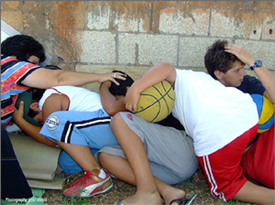Ben Wedeman, CNN’s senior correspondent in Jerusalem, speaks fluent Arabic and has a “working knowledge” of Hebrew, according to his profile on CNN.com. But that doesn’t mean he should understand the grievances of Arabic speaking Palestinians better than those of Hebrew speaking Israelis.
Yet it seems he does. How else could one explain Wedeman’s most recent contribution to CNN’s Behind the Scenes series, an online piece entitled “Reporter offers Bush a Gaza, West Bank misery tour”? In the article, Wedeman describes what he would show President Bush if he could take him on a private tour of the region. In doing so, he provides a disturbing glimpse into what an influential CNN reporter wants the public to notice — and conversely, what he thinks people should ignore.
Wedeman says he would first take Bush to Gaza, where the president would see some distressed areas not generally visited by foreign heads of state. The reporter would point out Gaza hospitals suffering from a lack of spare parts, and Gazans who are unable to get permits to travel into Israel for medical treatment. Babies die as a result of these travel restrictions, claims Wedeman.
What Bush wouldn’t encounter on this tour — and, consequently, what readers aren’t exposed to in the article — is anything that might show why Israel is cautious about allowing Gazans into Israel. The president, for example, wouldn’t be meeting Israeli border guards like the ones who risked their lives to prevent Wafa al-Bis from entering Israel from Gaza. True, the young Palestinian girl had a travel permit issued on humanitarian grounds by Israel after she severely burned herself in a cooking accident. But she also had a suicide belt hidden under her clothes. Her intended target, she later admitted, was the very hospital where Israeli doctors had been treating her injuries. Bush wouldn’t be meeting with those stunned doctors during his tour either.
Nor would the president be told that, despite incidents like this, a substantial majority of Gazans who seek to travel for treatment do in fact receive permits. According to the World Health Organization’s latest figures, 82 percent of permit requests have been approved since the Hamas takeover of the Strip.
|
Instead, the next stop of the tour would be the West Bank, where Wedeman would show the president checkpoints that inconvenience Palestinian travelers. (The reporter makes sure to detail a number of different trips that could be interrupted by checkpoints — Palestinians could be going “to their homes, universities, businesses, doctor’s appointments, or to visit a relative or a friend.”) Then, Bush would be told that when Israel arrests West Bank “militants,” this angers the Palestinian public.
But again, Wedeman would choose not to show the president anything that might explain why Israel maintains these checkpoints — for example, the bags of “sugar” recently confiscated at a checkpoint that were in fact filled with a banned chemical used to produce explosives. Nor would the reporter point out the schools where Palestinian children are taught to strive for “martyrdom”— a term generally used to describe the murder of Jewish civilians.
Such scenes are absent from the article because the Middle East Wedeman seeks to portray is one in which Palestinian concerns are central and Israeli concerns are virtually invisible. Indeed, the few times the article does actually hint at the Israeli point of view, the next passage invariably begins with the word “but” and ends with a Palestinian rebuttal. True, Israeli leaders “insist” that the sanctions they impose on Gaza are meant to force an end to rocket attacks against Israel. “But to the vast majority of Gazans — who have nothing to do with the missiles, who are powerless to stop the militants — it amounts to collective punishment.” Yes, Israel “may have valid reasons” to arrest militants in the West Bank, “but” these operations do irreparable damage to the standing of Palestinian leaders. Perhaps the thing that “Israel calls its security barrier” helps cut down on the number of attacks. “But” the Palestinians call it a “racist apartheid wall,” and it has devastated the Palestinian economy.
Like CNN’s Christiane Amanpour before him, Wedeman’s apparent desire to impugn Israel also prevents him from getting the facts straight. According to the article, Israel’s security barrier has destroyed Bethlehem’s economy by “reducing … to a trickle” the number of tourists visiting the town. Maybe in Wedeman’s warped version of the Middle East. But in reality, the number of tourists visiting Bethlehem during Christmas, the town’s main tourist season, has skyrocketed since Israel completed the barrier between Bethlehem and Jerusalem in 2005.
It’s easy to understand why a pro-Palestinian activist would want the American president and public to have a partial view of the Arab-Israeli conflict, and to focus only on the fragment of the picture that highlights Palestinian complaints. It’s easy to understand why that activist would ignore, dismiss or distort the rest of the picture. But from a journalist — especially a senior journalist working for an organization that calls itself “the most trusted name in news” — we expect impartiality. And that’s nowhere to be found in CNN’s look “behind the scenes” of the conflict.

